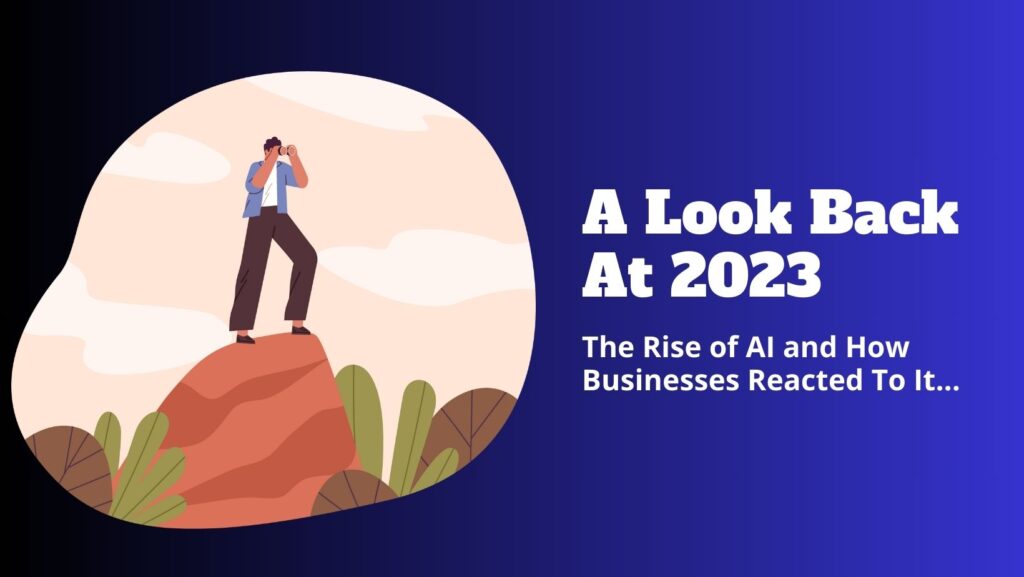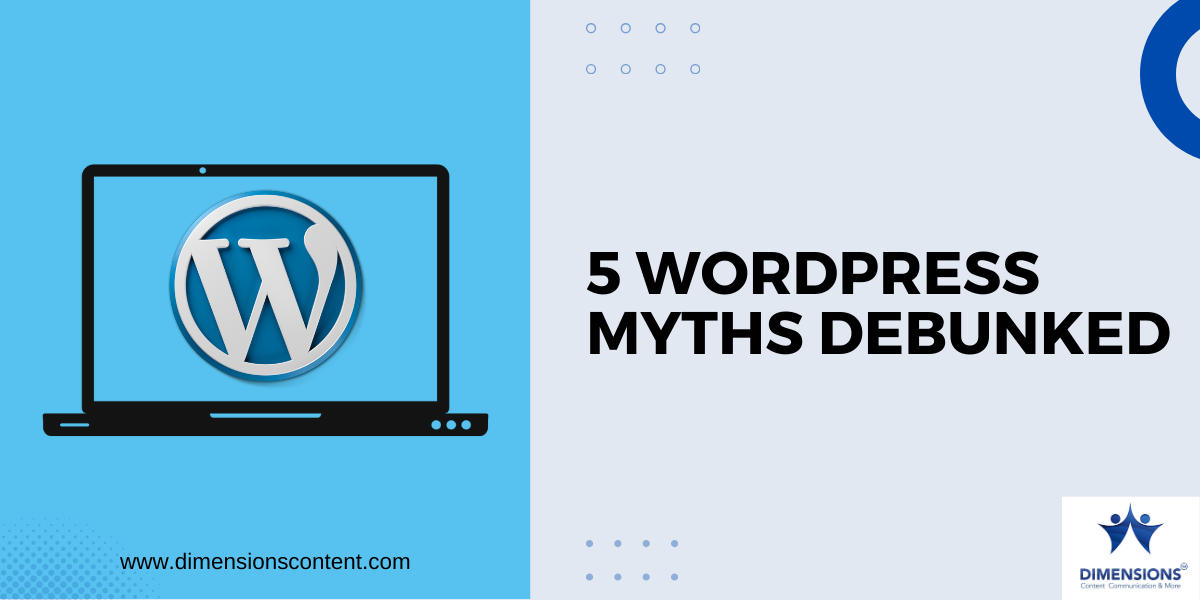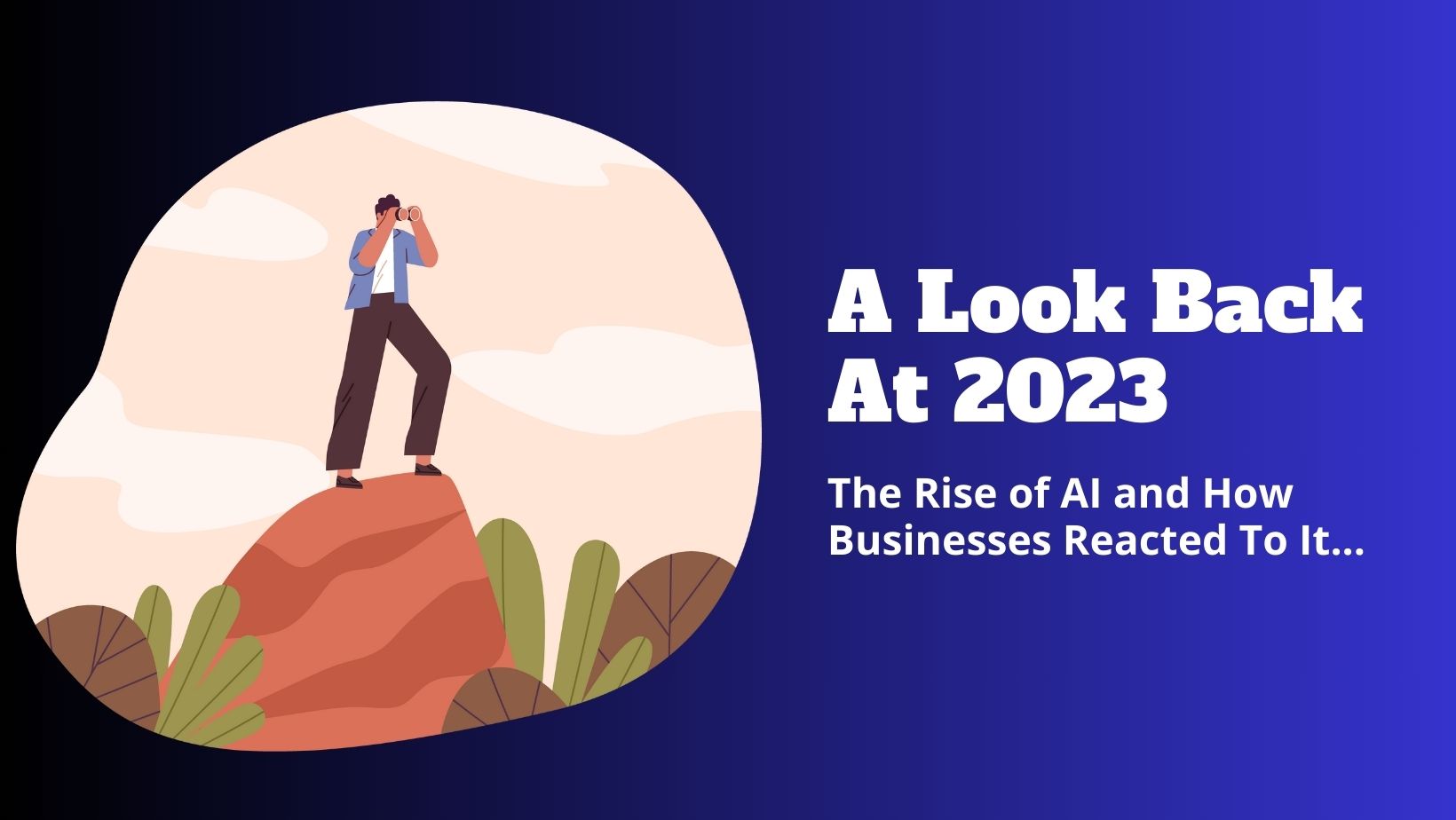It was the best of times, it was the worst of times...
In the annals of businesses for years to come, the year 2023 will mark a significant turning point, with Artificial Intelligence (AI) taking centre stage. This blog explores how businesses of all hues realigned their marketing strategies, adopted new technologies, and navigated the digital space.
We’ll also discuss what the future holds, based on what we know at present.

How Businesses Realigned Their Marketing Strategies
With ChatGPT turning one in December of 2023, businesses have seemingly undergone a tectonic shift in their marketing strategies. AI, with its ability to analyse incredibly vast amounts of data and make data-driven decisions in real-time, became the linchpin of marketing campaigns.
Here are the 5 primary ways how businesses coped:
- Personalised Customer Experiences:
AI-enabled hyper-personalization became the new norm. Advanced machine learning algorithms meticulously analysed customer data, including browsing history, purchase behaviour, and even social media interactions, to tailor marketing content in real-time. Customers received product recommendations and promotions aligned precisely with their preferences, leading to higher engagement and superior conversion rates.
- Predictive Analytics:
Businesses heavily relied on predictive analytics powered by AI. Machine learning models were trained on literal tonnes of historical data to forecast customer behaviour and market trends. This predictive power allowed companies to allocate resources more efficiently, optimise inventory management, and make informed decisions about product development and marketing campaigns.
- Chatbots and Virtual Assistants:
Customer service took a leap forward with AI-driven chatbots and virtual assistants. These AI-powered entities could handle a wide range of inquiries, from answering FAQs to providing real-time order updates. Customers received instant support 24/7, enhancing their overall experience and reducing the workload on human customer service agents.
- Automated Marketing Campaigns:
The automation of marketing campaigns reached new heights. AI algorithms managed email marketing, social media posting schedules, and even A/B testing. Marketers could set parameters, and AI would adjust campaigns in real-time to maximise reach and engagement. This reduced manual labour, improved consistency, and increased campaign effectiveness.
- Enhanced Data Security:
With increased reliance on AI, businesses invested significantly in cybersecurity measures. AI systems were fine-tuned both for performance and robust security. Protecting sensitive customer data from potential breaches became a top priority, and AI played a crucial role in identifying and mitigating security threats in real-time.
Technologies Global Businesses Adopted (and Services Reconsidered)
As firms rushed to embrace AI, they also had to make several tough decisions on which technologies to adopt and which services to reconsider- or discard. Some notable trends emerged:
- Cloud Computing:
The adoption of cloud services skyrocketed as businesses needed scalable and cost-effective infrastructure to support their AI initiatives. Cloud providers offered AI-focused services, making it easier for companies to implement and scale AI solutions without significant upfront investments in hardware.
- Edge Computing:
To reduce latency and enhance AI-powered applications like IoT devices, businesses increasingly leveraged edge computing. AI models could process data closer to the source, allowing real-time decision-making and reducing the over-reliance on centralised data centres.
- Quantum Computing:
Although still in its early stages, quantum computing showed tremendous promise in solving complex AI problems. Forward-thinking companies explored its potential, particularly in areas like drug discovery, data optimization, and cryptography, where classical computing fell far short.
- Ethical AI:
Companies prioritised ethical AI practices to maintain trust with consumers. They ensured that AI systems were transparent, fair, and unbiased. Auditing AI models for potential biases and adhering to ethical guidelines became standard practice.
- Consolidation of Services:
As AI automated various tasks, some services, especially in data entry and routine analysis, faced reduced demand. Companies reconsidered their reliance on these services and redirected resources toward higher-value activities like strategy development and creative content generation.
- AI-First Approach:
Companies that hesitated to invest in AI had to rethink their strategies. AI went from being a “nice-to-have” to a “must-have.” It became increasingly evident that businesses that embraced AI gained a competitive edge in terms of efficiency, customer engagement, and innovation.
What About The Digital Marketing Industry?
The digital marketing industry experienced an enormous shift in 2023. The industry – while shaken to its core – quickly adapted to this new technology’s growing influence, leading to several noteworthy developments.

- AI-Driven Ad Campaigns:
Digital marketers integrated AI into every facet of their advertising campaigns. AI algorithms optimised ad placements, targeted audiences with precision, and dynamically allocated advertising budgets based on real-time performance data.
The keyword here is ‘real-time.’
This resulted in improved ROI and more effective campaigns, with ads reaching the right audience at the right time.
- Influencer Marketing 2.0:
AI had a seminal effect on influencer marketing and how digital marketing companies leveraged it. Marketers used AI-powered tools to identify the most suitable influencers for their brands. These tools considered factors beyond mere follower count, analysing audience engagement, authenticity, and alignment with the brand’s values.
The result was more authentic and engaging partnerships that resonated with consumers.
- The Re-Emergence of Voice Search Optimization:
The rise of voice assistants like Amazon’s Alexa and Google Assistant prompted digital marketers to prioritise voice search optimization. AI-driven SEO tools specifically tailored strategies for voice search, ensuring that brands remained visible in voice-enabled devices. This optimization became crucial as consumers increasingly relied on voice commands for information and shopping.
It became even more relevant as the ordinary Google Search started including an AI-generated overview at the top.
- Data-Driven Creativity:
AI, with its ability to process colossal datasets, offered marketers insights into consumer preferences and content performance. Marketers harnessed this data to craft emotionally resonant and persuasive content. AI-assisted content creation tools helped generate content ideas, headlines, and even entire articles, streamlining the creative process.
- Social Media Management Redefined:
AI-powered social media management tools not only scheduled posts but also analysed engagement patterns. They provided recommendations for optimal posting times, content types, and even sentiment analysis. Marketers could fine-tune their social media strategies based on real-time insights, improving brand visibility and engagement rapidly.
- Chatbots in Customer Service:
Digital marketing teams integrated AI chatbots into their websites and social media platforms. These chatbots provided immediate assistance to customers, answering queries, providing product recommendations, and guiding users through the sales funnel. This improved customer satisfaction and helped increase engagement and conversion rates.
The Future: 2024 and Beyond
As we look forward to 2024-’25 and beyond, the future of AI promises even more transformative changes across industries and society itself. The innovations and trends that started in 2023 are poised to evolve and reshape the global business landscape in ways hitherto unimagined.
- Hyper-Personalization Reaches New Heights:
AI-driven personalization will become even more sophisticated. Businesses will harness AI to create not merely personalised marketing content but actual tailor-made products and services. Imagine a world where AI designs custom clothing, formulates personalised skincare products, or curates unique travel experiences based on individual preferences.
Some way it’s the highway to dystopia. Others are more optimistic.
- AI in Healthcare Revolutionizes Diagnosis and Treatment:
In the healthcare sector, AI will play an increasingly critical role in diagnosing diseases, suggesting treatment plans, and monitoring patient health. AI-powered medical devices and diagnostic tools will become more accessible, leading to earlier disease detection and much-improved triage and treatment outcomes.
- Autonomous Vehicles Redefine Transportation:
Autonomous vehicles will become a more common sight on roads worldwide. AI will power self-driving cars, trucks, and drones, changing transportation itself in a way, reducing accidents, and heightening efficiency. The logistics and delivery industry will see significant disruptions as AI-driven autonomous delivery becomes the norm.
- AI-Powered Education and Lifelong Learning:
The education sector will embrace AI to personalise learning experiences for students of all ages. AI-driven tutors and virtual classrooms will adapt to individual learning styles, ensuring that education remains engaging and accessible to everyone throughout their lives.
- AI-Generated Content and Creativity:
AI will take on a more significant role in content creation across various industries. It will generate not only written content but also art, music, and even video games. Creatives will collaborate with AI tools to enhance their work, resulting in entirely new forms of artistic expression.
There are fears that AGI (Artificial General Intelligence) will beat human beings at every task and endeavour. But so far, those ideas exist only on paper.
- AI in Financial Services:
The financial industry will see widespread adoption of AI for risk assessment, fraud detection, and portfolio management. AI-powered chatbots and virtual financial advisors will provide real-time financial advice, empowering consumers to make informed decisions about investments and financial planning.
- AI for Sustainability:
AI will play a pivotal role in addressing global environmental challenges. It will optimise resource usage, predict natural disasters, and enable more efficient renewable energy production. AI-driven solutions will help businesses reduce their carbon footprint and contribute to a far more sustainable future.
- AI-Powered Healthcare Research:
AI will accelerate scientific research by digesting vast amounts of data and simulating complex biological processes. Drug discovery, genomics, and disease modelling will benefit from AI-driven insights, potentially leading to breakthroughs in the treatment of diseases like Alzheimer’s, ALS, certain types of cancer, and so on.
- Quantum Computing Takes Center Stage:
Quantum computing will continue to advance. Businesses will explore its potential for solving complex AI and optimization problems, revolutionising fields such as cryptography, materials science, and AI itself advancing research in artificial intelligence.
- Ethical AI Regulations:
Governments and international bodies will establish comprehensive regulations to govern AI’s development and use. Ethical AI principles, transparency, and accountability will be enforced to ensure that AI technologies benefit society without harming individuals or marginalised groups.
The future beyond 2023 is brimming with possibilities as AI continues to evolve and integrate into every aspect of our lives. Businesses that adapt to these changes, prioritise ethical AI practices, and remain agile in their strategies will thrive in this new era of innovation that borders on the edge of science fiction..
The journey that began in 2023 as the “Year of AI” will extend well into the future, fundamentally reshaping the way we work, live, and interact with technology. It’s an exciting time to be part of this AI-driven evolution as we collectively shape a more intelligent, efficient, and interconnected world.





